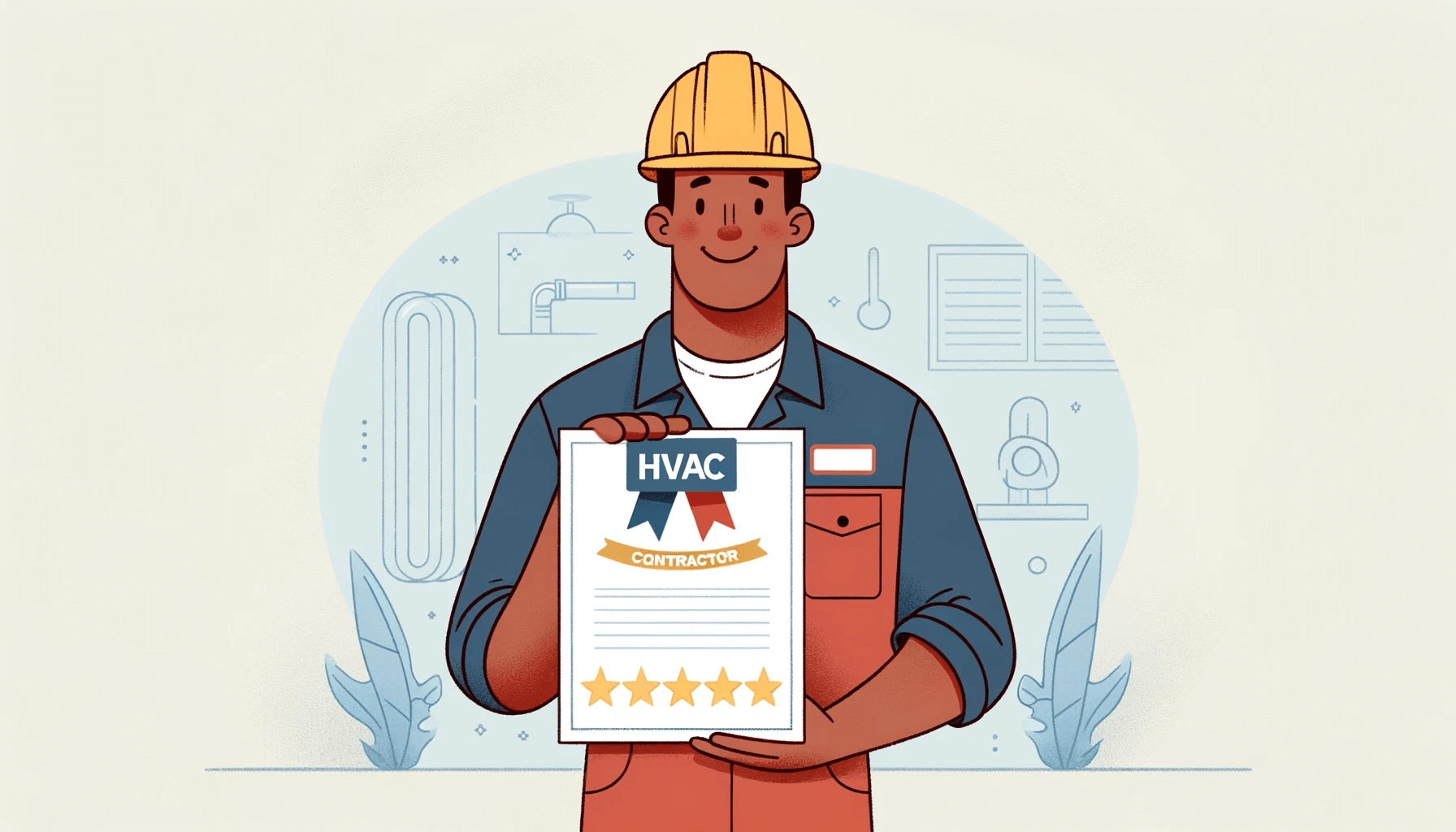Table of Contents
- Understanding HVAC Licensing
- Why Do HVAC Professionals Need a License?
- Types of HVAC Licenses
- How to Get an HVAC License?
- HVAC License Requirements by State
- What is an HVAC Certification?
- Types of HVAC Certifications
- HVAC Certification Process and Requirements
- What Are the Benefits of HVAC Certifications?
- FAQ
- Can You Do HVAC Work Without a License?
- How Long Does It Take to Get an HVAC Certification?
- What States Do Not Require an HVAC License?
- What States Require an HVAC License?
- What License Do I Need to Start an HVAC Business?
- Sum up
Starting a business in the HVAC industry is not just about the skill and the will; it’s about fulfilling legal requirements and industry standards, too. Obtaining the necessary HVAC licenses and certifications could be your golden ticket to not just enter this field but to thrive in it.
So, what does it take? Stick with us to discover the ABCs of HVAC licensing and certifications and why these credentials can help showcase your expertise and grow your business.
Understanding HVAC Licensing
HVAC licensing is a foundational step for starting your business and advancing your career. Let’s explore the compelling reasons for having a license, as it is more than just a formality in this field.
Why Do HVAC Professionals Need a License?
HVAC licensing isn’t merely procedural; it symbolizes a professional’s competence and expertise.

Key reasons to get an HVAC license include:
- Legal Compliance: Ensuring that professionals adhere to licensing standards is a way to safeguard consumers against substandard services and potential hazards. Operating without a license can lead to severe penalties. For example, according to the Contractors State License Board of California, operating without a license in California can result in jail terms of up to six months and fines upwards of $15,000.
- Building Trust with Customers: A license demonstrates a contractor’s commitment to their profession and adherence to legal and quality standards, which builds trust with customers.
- Enhanced Career Prospects: Licensed contractors enjoy better earnings, job security, and career growth due to compliance with legal and industry standards, insurance coverage, and the ability to undertake more significant and legally compliant projects. For instance, licensed general contractors in the U.S. have an average annual pay of $97,202.
An HVAC license serves as your passport to a world of professional respect, greater financial rewards, and legal peace of mind.
Types of HVAC Licenses
When it comes to HVAC licensing, one size doesn’t fit all. The type of license you pursue will depend on your career stage and specific goals within the industry. Here’s a closer look at the three primary types of HVAC licenses and what you’ll need to secure each one:
- Apprenticeship License: This entry-level license allows you to assist in basic tasks under supervision. Costs are minimal, usually between $100 and $200, often covered by your employer. The main requirement is a high school diploma. Strong communication and problem-solving skills are a plus.
- Journeyman License: This elevates you to solo work on intricate projects like installations and repairs. You’ll need to finish an apprenticeship and pass a state exam. Expect costs around $300 to $500. Technical training and a solid understanding of electrical systems are required.
- Contractor License: With this license, you can design HVAC systems for large setups and manage teams. You’ll need at least five years of experience and must pass a rigorous exam. Costs range from $700 and $1,000. An Associate’s degree in HVAC technology and strong managerial skills are necessary.
How to Get an HVAC License?
Getting an HVAC license is more than just filling out a form and paying a fee. It’s a multi-step process that requires careful preparation and commitment.

Here’s how you can navigate through these steps to secure the HVAC license that aligns with your career goals:
- State-Specific Research: Each state has distinct requirements. For instance, while California mandates 4 years of experience before applying for a contractor’s license, Texas requires a combination of formal training and work experience totaling 4 years.
To find state-specific HVAC license requirements, start with your state’s licensing board website for guidelines and procedures. Local HVAC schools and trade organizations can also offer insights and exam prep materials. Lastly, consider consulting current HVAC professionals in your state for firsthand advice. - Undergo Necessary Training: The type of HVAC training you need depends on your target license. For an apprenticeship license, expect 3-5 years of supervised, hands-on training combined with classroom lessons. Journeyman license candidates typically focus on specialized topics like electrical systems and thermodynamics during their apprenticeships, plus exam prep. Contractor license seekers often require an Associate’s degree in HVAC technology, covering technical HVAC skills and business management basics.
- Pass Required Exams: After training, you’ll need to prove your knowledge through exams covering a broad spectrum of HVAC topics, including system design, installation techniques, maintenance procedures, safety protocols, and the principles of heating and cooling. These exams are typically administered by state or local licensing boards. In some cases, trade organizations may also offer exams that meet state requirements.
- Complete Documentation: Once you’ve passed the exams, you’ll need to submit an application accompanied by required documents such as proof of training, work experience, background checks, and insurance proof. Additionally, fees can range from $50 to $300, depending on the state and specific certification sought.
- Explore Financial Assistance Options: While obtaining an HVAC license requires time and financial investment, several ways exist to ease the burden. Educational costs can vary greatly, ranging from $500 to $35,000 depending on your chosen path, such as apprenticeships or formal education through vocational schools or community colleges. Thankfully, many organizations provide scholarships, grants, and other financial aid to assist with your HVAC education and licensing costs. Some organizations include:
HVAC License Requirements by State
Since license requirements can vary significantly from one state to another, it’s beneficial to understand the varied licensing requirements across the U.S.
| State | Issuing Office | State Requirements |
|---|---|---|
| Alabama | Alabama State Board of Heating and Air Conditioning | Requires a State Board Mechanical Contractor’s license for work exceeding $50,000. |
| Alaska | Department of Commerce, Community, and Economic Development | Mechanical Contractor and Mechanical Administrator licenses are needed for commercial work. |
| Arizona | Arizona Registrar of Contractors | Requires passing trade and business exams and securing a bond and worker’s compensation insurance. |
| Arkansas | Arkansas Department of Labor and Licensing | Class A and B licenses for work exceeding $20,000 and $50,000, respectively. |
| California | Contractors State License Board | Requires a C-20 HVAC Contractor License. |
| Colorado | Colorado State Electrical Board and Colorado State Plumbing Board | No state-level licensing, but local requirements often apply. |
| Connecticut | Department of Consumer Protection | Requires an S-1 or S-2 Contractor’s license. |
| Delaware | Board of Plumbing, Heating, Ventilation, etc. | Requires a Delaware Business License for HVACR contractors. |
| District of Columbia | Board of Industrial Trades | Requires passing an examination and meeting additional criteria such as completing a Local Representative Affidavit. |
| Florida | Department of Business & Professional Regulation | Requires Class A or Class B Air Conditioning Contractor’s license. |
| Georgia | Construction Industry Licensing Board | Conditioned Air Contractor licenses Class I and II available. |
| Hawaii | Professional and Vocational Licensing Division | C-52 Ventilating and Air Conditioning Contractor License required. |
| Idaho | Division of Building Safety | Requires two years of journeyman experience, passing an examination, and securing a $2,000 compliance bond. |
| Illinois | Cook County Department of Building and Zoning | No state-level requirements, but local licensing is usually necessary. |
| Indiana | City of Evansville | No state-level license is needed, but local licenses are often required. |
| Iowa | Iowa Plumbing and Mechanical Systems Board | Contractor registration is required. |
| Kansas | Kansas Mechanical Trades Review Board | No state-level requirements, but local licensing is often necessary. |
| Kentucky | Department of Housing, Buildings, and Construction | State HVAC Contractor license required. |
| Louisiana | Louisiana State Licensing Board for Contractors | State HVAC Contractor license required. |
| Maine | Office of Professional and Occupational Regulation | Requires an Oil and Solid Fuel or Propane and Natural Gas license. |
| Maryland | Maryland Department of Labor, Licensing, and Regulation | Requires HVAC Mechanical License. |
| Massachusetts | Board of State Examiners of Plumbers and Gas Fitters | Requires a Refrigeration Technician license. |
| Michigan | Michigan Department of Licensing and Regulatory Affairs | Requires a Mechanical Contractor’s License. |
| Minnesota | Minnesota Department of Labor and Industry | Requires a state license or local bonding, depending on jurisdiction. |
| Mississippi | Mississippi State Board of Contractors | Requires a Mechanical Contractor’s License. |
| Missouri | St. Louis County Board of Examiners for Mechanical Licensing | No state-level license is needed, but local licenses are often required. |
| Montana | Montana Department of Labor & Industry | Requires Construction Contractor Registration |
| Nebraska | Department of Labor | No state-level license is needed, but local licenses are often required. |
| Nevada | Nevada State Contractors Board | A C21 Air Conditioning Contractor’s license is required. |
| New Hampshire | Mechanical Licensing Board | Gas Fitter license required. |
| New Jersey | New Jersey Division of Consumer Affairs | Requires Master HVACR License. |
| New Mexico | New Mexico Regulation and Licensing Department | MM-98 Mechanical license required. |
| New York | New York City Building Department | No state-level requirements, but local licenses are usually required. |
| North Carolina | North Carolina State Board of Examiners | Requires an H-1, H-2, or H-3 class license. |
| North Dakota | Secretary of State’s office | Requires a Mechanical Contractor license. |
| Ohio | Department of Commerce | Requires Ohio HVAC license for commercial work. |
| Oklahoma | Oklahoma Construction Industries Board | Requires Mechanical Contractor or Mechanical Journeyman license. |
| Oregon | Construction Contractors Board | Requires an Oregon HVAC/R license. |
| Pennsylvania | City of Philadelphia Business Services Department | No state-level requirements, but local licensing is usually necessary. |
| Rhode Island | Department of Labor and Training | Requires a Mechanical Contractor’s license. |
| South Carolina | Department of Labor, Licensing and Regulation | Requires a Mechanical Contractor’s license. |
| South Dakota | South Dakota Plumbing Commission | Contractor’s License required |
| Tennessee | Tennessee Board for Licensing Contractors | Requires Mechanical Contractor’s license for work exceeding $25,000. |
| Texas | Texas Department of Licensing and Regulation | Requires Air Conditioning and Refrigeration Contractor’s License. |
| Utah | Utah Division of Occupational and Professional Licensing | Requires an S350 HVAC Qualifier license. |
| Vermont | Vermont’s Office of Professional Regulation | No state-level requirements, but local licensing is often necessary. |
| Virginia | Department of Professional and Occupational Regulation | Requires a Class A, B, or C Contractor license. |
| Washington | Washington State Department of Labor & Industries | Requires an HVAC/R Specialty Electrical license. |
| West Virginia | Division of Labor | Requires an HVAC Technician and Contractor license. |
| Wisconsin | Department of Safety and Professional Services | Requires HVAC Qualifier Certificate. |
| Wyoming | Wyoming Trades Certification Program | No state-level requirements, but local licensing is often necessary. |
What is an HVAC Certification?
An HVAC certification is a professional credential indicating that a technician has acquired specific skills or knowledge, helping you acquire more HVAC leads. A certification involves specialized training and mastery of particular technologies or methodologies.

Unlike licensing, certifications are often optional and can provide a competitive edge in job markets or customer trust. Moreover, certifications usually come from industry organizations and vendors, not governmental bodies.
While both are indicators of a technician’s capability, a license is a must-have permit for legal operation. In contrast, certifications are value-added credentials that speak to a technician’s specialized skills and commitment to ongoing education.
Types of HVAC Certifications
A license can get your foot in the door, but the advanced certifications truly elevate your standing as an HVAC technician. Key HVAC certifications such as the EPA Section 608 and NATE testify to your expansive skill set and knowledge base, ensuring you’re always a cut above the rest.
- EPA Section 608 Technician Certification: An HVAC EPA certification is mandatory for technicians who work with refrigerants. It encompasses:
- Type I: For small appliances like air conditioners and refrigerators.
- Type II: Tailored for high-pressure appliances, including residential air conditioners and refrigeration units.
- Type III: Aimed at low-pressure appliances such as chillers.
- Type IV: The universal certification covering all equipment types.
- NATE Certification: Championed by North American Technical Excellence, this certification demonstrates your proficiency in areas like installation, servicing, refrigerants, and core units.
- HVAC Excellence: This organization provides program accreditation and offers employment-ready certifications in air conditioning, light commercial air conditioning, and basic refrigeration and charging procedures.
- Refrigeration Service Engineers Society (RSES): In partnership with NATE, RSES provides additional certifications for commercial air conditioning, heating, commercial refrigeration, and HVAC-R electrical systems.
- Refrigerating Engineers and Technicians Association (RETA): RETA offers specialized certifications for technicians in industrial refrigeration. These include the Certified Assistant Refrigeration Operator (CARO) certification for entry-level technicians and the Certified Industrial Refrigeration Operator (CIRO) certification.
According to the New England Institute of Technology, the costs for EPA, NATE, HVAC Excellence, RSES, or RETA certifications range from $25 to $250 per test.
HVAC Certification Process and Requirements
Journeying toward an HVAC certification?

Here’s your roadmap:
- Choose Your Certification Path: Identify which certification aligns best with your aspirations.
- Meet the Eligibility Standards: This could mean having the right educational background; typically, a high-school diploma focusing on mathematics and physics is a big help to build a robust foundation.
- Get Trained: Enroll in an accredited HVAC program that community colleges or vocational schools offer.
- Undergo an Apprenticeship: Associations like the Air Conditioning Contractors of America offer apprenticeships that span three to five years, ensuring hands-on experience.
- Accumulate Practical Experience: Before you get certified, at least 12 months of on-ground experience is recommended before pursuing certifications like EPA or NATE.
- Get Ready for the Exam: Preparation is key, as the exams rigorously test your understanding of HVAC knowledge and pertinent regulations.
What Are the Benefits of HVAC Certifications?
Diving into HVAC certifications opens the door to opportunities and career growth. Here’s what you stand to gain:
- Proof of Proficiency: Rather than merely asserting your capabilities, certification serves as concrete evidence that you meet the industry standards set by seasoned professionals in the HVAC field.
- Enhanced Expertise: Through HVAC certification, you’ll gain invaluable insights and hands-on skills that empower you to confidently address air quality complexities and excel in temperature control techniques.
- A Competitive Edge: In a market teeming with HVAC technicians, your certification can give you a noticeable edge, enhancing your prospects even for high-profile projects.
- Enhanced Earnings: Certifications are synonymous with expertise, which commands a premium. Certified technicians often enjoy better pay packages. For instance, on average, technicians with an NATE certification earn 12.2% more than non-certified technicians. In addition, employers are often willing to pay higher salaries for NATE-certified technicians, valuing the certification at over $10,000 a year.
FAQ
Navigating the world of HVAC licensing and certifications can be intricate. To help clarify common queries, we’ve compiled a set of frequently asked questions.
Can You Do HVAC Work Without a License?
Operating an HVAC business without a license is generally illegal and can lead to severe penalties. In most states, taking on minor HVAC tasks for profit without a license could result in fines or even criminal charges.
The activities that might be legally permitted without a license are generally restricted to personal, non-commercial tasks. Therefore, for those looking to provide a broad spectrum of HVAC services as a business, obtaining a license is strongly recommended to comply with state and local laws.
How Long Does It Take to Get an HVAC Certification?
Becoming HVAC-certified isn’t an overnight journey. When factoring in enrolling in an HVAC training program, understanding the intricacies of the profession, and gaining hands-on experience, aspiring technicians can expect a timeline of two to three years to meet all requirements. The duration might vary slightly based on specific certifications.
What States Do Not Require an HVAC License?
Wyoming, Vermont, Illinois, Arizona, New York, Colorado, Kansas, Missouri, and Indiana do not require an HVAC license.
Even if your state doesn’t require an HVAC license, local governments might. Check your local building department’s website or contact them directly for requirements. Industry forums and associations can also offer insights – double-check your information.
What States Require an HVAC License?
The majority of states uphold rigorous HVAC licensing requirements. Such stipulations are in place to guarantee the safety and proficiency of the services provided. Here’s a list of states that require an HVAC license:
- Alabama
- Alaska
- Arkansas
- California
- Connecticut
- Delaware
- Florida
- Georgia
- Hawaii
- Idaho
- Iowa
- Kentucky
- Louisiana
- Maine
- Maryland
- Massachusetts
- Michigan
- Minnesota
- Mississippi
- Montana
- Nebraska
- Nevada
- New Hampshire
- New Jersey
- New Mexico
- North Carolina
- North Dakota
- Ohio
- Oklahoma
- Oregon
- Pennsylvania
- Rhode Island
- South Carolina
- South Dakota
- Tennessee
- Texas
- Utah
- Virginia
- Washington
- West Virginia
- Wisconsin
Prospective HVAC technicians and contractors should thoroughly research their state’s specific criteria, as each can have its unique set of guidelines and procedures to secure a license.
Start by checking your state’s official website or contacting the State Licensing Board for Contractors for licensing criteria.
Online forums, trade schools, and HVAC organizations can also provide valuable info.
What License Do I Need to Start an HVAC Business?
A contractor license is usually your best bet to start an HVAC business, as it showcases your skills and helps gain client trust. It’s tailored for those planning to run their own HVAC company. For specifics on license types and requirements, see our earlier section on ‘Types of HVAC Licenses.’ Make sure to comply with both state and local rules to ensure your business thrives.
Sum up
Embarking on an HVAC career involves crossing t’s and dotting i’s regarding licenses and certifications. Not only do they make you more appealing to customers, but they can also serve as your ladder to career progression. Start your journey today; it’s challenging but definitely rewarding.
Table of Contents
- Understanding HVAC Licensing
- Why Do HVAC Professionals Need a License?
- Types of HVAC Licenses
- How to Get an HVAC License?
- HVAC License Requirements by State
- What is an HVAC Certification?
- Types of HVAC Certifications
- HVAC Certification Process and Requirements
- What Are the Benefits of HVAC Certifications?
- FAQ
- Can You Do HVAC Work Without a License?
- How Long Does It Take to Get an HVAC Certification?
- What States Do Not Require an HVAC License?
- What States Require an HVAC License?
- What License Do I Need to Start an HVAC Business?
- Sum up


